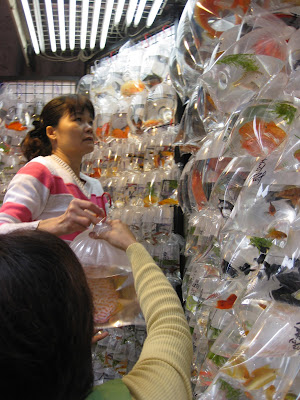 (On the old city wall.)
(On the old city wall.) (Two little girls playing near the old city wall.)
(Two little girls playing near the old city wall.) (The gate of the old city wall.)
(The gate of the old city wall.) (A convenience store [便利店 byen-lee dyen] in Lower Half City.)
(A convenience store [便利店 byen-lee dyen] in Lower Half City.) (Near the old city wall.)
(Near the old city wall.) (A man selling traditional Chinese medicine in Lower Half City, sometime in the early afternoon.)
(A man selling traditional Chinese medicine in Lower Half City, sometime in the early afternoon.) (I am not sure whether this is a storefront or not. However, the back room with the television is some one's living quarters.)
(I am not sure whether this is a storefront or not. However, the back room with the television is some one's living quarters.) (Lower Half City is located on a hilly part of Chongqing. There are many steps!)
(Lower Half City is located on a hilly part of Chongqing. There are many steps!) (Street view.)
(Street view.) (Clothes and shoes. The front door of a very old/traditional Chongqing household.)
(Clothes and shoes. The front door of a very old/traditional Chongqing household.) (A little boy sitting at the mouth of an alley way. Lower Half City is filled with random alleyways and helter-skelter steps.)
(A little boy sitting at the mouth of an alley way. Lower Half City is filled with random alleyways and helter-skelter steps.)Last Tuesday Ben and I decided to have our weekly adventure. The weather was nice enough for an afternoon adventure. Normally we have "Adventure Thursdays" but last week we made an exception because of the favorable weather.
Two weeks ago my friend Jane had given me an old photocopy of a guide for Chongqing. One of the pages in the guide was for a place called 下半城 [sha-ban chung] or Lower Half City. In the guide it said that not many tourists go because this area is considered one of the poorest areas in Chongqing. Even though this place has done the best job of preserving the way Chongqing used to be. Hilly, many steps, ramshackle housing here and there, people playing Mah-jongg while smoking, old ladies selling things, laundry hung out everywhere you look, little kids playing in alleys. That's just what it is.
Ben and I had a field day taking pictures of the happenings in Lower Half City. Afterwards I felt guilty because I wouldn't like it if someone shamelessly photographed my neighborhood. But also I am afraid that in the future Lower Half City might not exist because of all the new development going on in Chongqing. Especially because Lower Half City is located right next to the longest river in China, the Yangtze. I was feeling a little torn!
The residents of Lower Half City were very kind. They smiled a lot. Many times they would warn us of dead-ends up ahead. Telling us that it's "not good walk!" in Chinese, meaning you won't accomplish anything by walking there...like finding another way out other than the way you came in. One man told us "In a place like this you can walk for days and still see something new."
 (Ramshackle houses.)
(Ramshackle houses.)
The residents of Lower Half City were very kind. They smiled a lot. Many times they would warn us of dead-ends up ahead. Telling us that it's "not good walk!" in Chinese, meaning you won't accomplish anything by walking there...like finding another way out other than the way you came in. One man told us "In a place like this you can walk for days and still see something new."
 (Ramshackle houses.)
(Ramshackle houses.) 













































